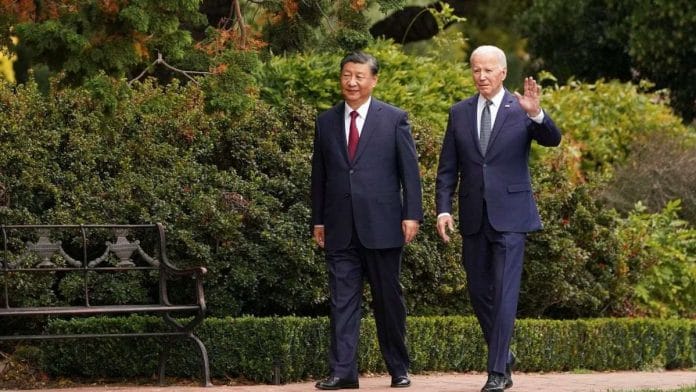New Delhi: In what is seen as a step towards thawing frosty relations between the two countries, US President Joe Biden met his Chinese counterpart Xi Jinping in Woodside, California, Wednesday discussing a host of subjects, including resumption of bilateral military ties besides the vexed issue of Taiwan.
The US and China have agreed to resume high level military-to-military communications, defence policy coordination talks, maritime consultative agreement meetings and telephone conversations between theatre commanders, according to the White House.
In a post on X after the summit, Biden said that resumption of military-to-military communications was “vital” to avoid “miscalculation” and “prevent conflict”.
He termed the talks “some of the most constructive and productive discussions we have had” in remarks to the press after emerging from the discussions with Xi.
The US president also hailed the resumption of bilateral cooperation to combat global illicit drug manufacturing and trafficking, especially on synthetic drugs like fentanyl and its precursor chemicals and pill presses to drug cartels.
Biden and Xi met during the Asia-Pacific Economic Cooperation (APEC) Economic Leaders’ Week conference, being chaired by the US in San Francisco.
APEC is a regional forum established in 1989, consisting of 21 economies that contribute 40 percent of the global population, nearly 50 percent of global trade and more than 60 percent of US goods exports, according to its website.
Some of the economies part of the APEC are the US, China, Australia, Canada, Indonesia, Japan, South Korea, the Philippines, Thailand, Malaysia and Russia.
At the end of the press conference held Wednesday, Biden reiterated his belief that “Xi is a dictator”, saying: “Well, look he is. I mean he is a dictator in the sense that he is a guy that runs a country based on a form of government totally different to ours.”
Ties between the US and China — the world’s two largest economies — have been strained, especially since the spy balloon incident this year, when a high-altitude balloon allegedly originating from China flew over the US.
The two sides have also escalated a trade war, with China instituting new export curbs on critical minerals last month.
The US, along with its allies, has also been pushing the notion of “de-risking” from China, establishing the Minerals Security Partnership and boosting its own overseas development programmes such as the India-Middle-East-Europe Economic Corridor and its recent $553 million funding in the expansion of the Port of Colombo, in an effort to compete with Beijing.
Also Read: Why China’s local government debt nearly doubled in 5 yrs, and why problem may get worse
‘World big enough for 2 superpowers’
Speaking before his summit with Biden, Xi declared that the world was big enough for both the US and China to succeed and that the success of one country was an opportunity for the other.
“I am still of the view that major-country competition is not the prevailing trend of current times and cannot solve the problems facing China and the United States or the world at large. Planet earth is big enough for the two countries to succeed, and one country’s success is an opportunity for the other,” said Xi, according to a White House statement.
“For two large countries like China and the United States, turning their back on each other is not an option. It is unrealistic for one side to remodel the other, and conflict and confrontation has unbearable consequences for both sides,” Xi added.
Human rights & Taiwan
The White House confirmed that discussions were held on a wide variety of topics, including climate change, human rights and Taiwan in a readout published after the summit.
Biden reiterated his support for the one-China policy, while also asserting that the US would be against any unilateral change to the status quo.
“On Taiwan, President Biden emphasised that our one-China policy has not changed and has been consistent across decades and administrations. He reiterated that the United States opposes any unilateral changes to the status quo from either side, that we expect cross-strait differences to be resolved by peaceful means, and that the world has an interest in peace and stability in the Taiwan Strait,” the readout said.
Biden asserted that the US will continue to take actions to prevent advanced US technologies from being used to harm its interests. The US president also shared his concerns over human rights abuses in the province of Xinjiang, Tibet and Hong Kong, according to the White House readout.
Biden faced numerous queries from the press regarding the Israel-Hamas conflict, where he reiterated US support for Israel’s “right to defend itself” and promised to work on ensuring the safe return of hostages captured by Hamas. He asserted that the only solution to the conflict was a “two-state solution”.
“I can’t tell you how long it’s going to last… But I can tell you I don’t think it ultimately ends until there’s a two-state solution. I made it clear to the Israelis, I think it’s a big mistake for them to think they’re going to occupy Gaza,” Biden said at the press conference.
(Edited by Nida Fatima Siddiqui)
Also Read: Despite booming trade, US-China relationship evolving into an ‘ideological rivalry’






